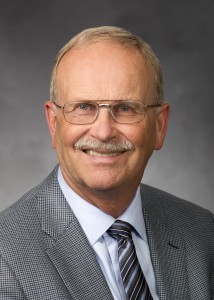Erin Bigler, PhD, is a highly awarded author or coauthor of more than 800 articles and a pioneer who helped lay the groundwork in the field of neuropsychology.
The John Wesley quote, “Do all you can, by all the means you can, in all the ways you can, for all the people you can, for as long as you can,” sits in Bigler’s office. It is something he has sought to do in his area of study — traumatic brain injury, behavioral outcomes and the effect of Alzheimer’s and autism.
Tracy Abildskov, a BYU lab director, has worked with Bigler for 22 years. He said Bigler tries to do as Wesley says for students, co-workers, family members and other universities. He tries to put Wesley’s quote into practice in his own life, and it shows in his hard work and more than 800 published articles for his field of study. Helping people is one of his top priorities.
“I’ve always had an interest in science and proving things, starting with high school experiment projects. I always saw myself as more of a naturalist,” Bigler said. “Actually back in those days I thought I would be something like a biologist, and I actually thought I might be a marine biologist … so all of the science projects I did when I was in junior high and high school were all science projects (that had) something to do with the sea. … It always fascinated me to look at animal behavior.”

Bigler came to BYU and followed his fascination of animal behavior in the 1960s. This time was “the peak” of animal behaviorism. It was through his study and doing experiments with the popular “Skinner Box,” with rats or pigeons hitting levers and buttons, that he became interested in psychology.
“I got very involved in studying animal behavior from that conditioning standpoint,” he said. “That’s what led me to a career in psychological research.”
Technology advanced, and CAT scans and other imaging software came to be. These scans can take pictures inside the brain, and scientists can study them. Bigler then immediately moved on to the field of neuropsychology and has remained there ever since.
Abildskov described his working relationship and how it has progressed with Bigler.
“At the beginning he was a boss; then it progressed into a mentorship, then it progressed into a friendship and now … what’s closer than a friendship? … We are concerned about people who are injured and what we can do to help.”
During his time as a professor, Bigler and his colleagues have worked hard in their field and have won many prestigious awards in the field of neuroscience. His favorite recognition was an award that his students nominated him for within a group of nearly 5,000 other professors.
Adam Hall, a neuroscience major and research volunteer, said, “I really like Dr. Bigler. He is really interested in the research that he does, and he has done a lot.”
Bigler has loved his career as a professor and researcher in the neuroscience field.
“This next year is my 40th year as a professor. When you’re later in your career that’s when you look back, and really the impact is not the number of publications that you have published or the grants and awards you get,” Bigler said. “It’s the old adage of (pay it forward) that’s really what it’s all about. It’s giving that information, mentoring, supervision, training to another student then having that student go out and do something with their students.”
This dream became a reality to Bigler a few weeks ago. He was visiting a professor at the University of Colorado to give a talk. A professor came to pick Bigler up at the hotel to take him to the university for his talk. After a few minutes of talking with the man, Bigler realized he was a student of one of the students Bigler taught long ago. The professor was in essence his “academic grandchild” that he had never met before.
Bigler’s plans for the future are very simple: “Make it (helping people with his research) bigger and better.”
Bigler has done a lot for the community of neuropsychology, but more importantly he has done a lot for the students, colleagues and faculty around him.




